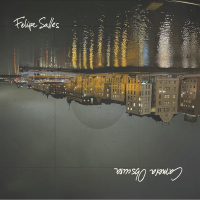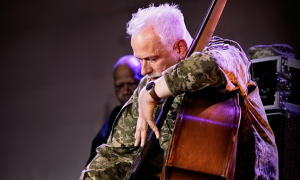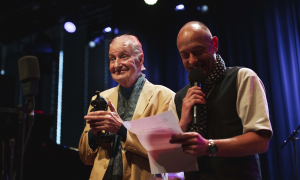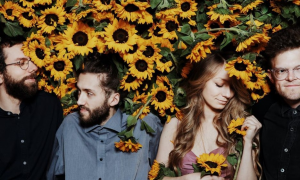Home » Jazz Articles » Profile » Dial H for Hitchcock
Dial H for Hitchcock

Courtesy Rob Blackham
Depping in other peopleĪ»s bands is my favorite thing to do... How are you going to make it sound better, how are you going to make it work?
—Alex Hitchcock
Alex Hitchcock
saxophoneJasper Høiby
bass"Honestly, depping in other people's bands is my favorite thing to do, I think. You get this pad of new music in front of you and you're like, Right, how are you going to make it sound better, how are you going to make it work?" He really likes the challenge of contributing to other people's music, and he enjoys the variety afforded by playing one kind of music on a Friday night, and something completely different on Saturday.
With such a positive and collaborative attitude, it's not surprising that Hitchcock is in such demand across the London nu-jazz scene: he's a member of the

Herbie Hancock
pianob.1940
Deschanel Gordon
piano
Kirk Lightsey
pianob.1937

Matt Ridley
bassb.1981
As if that wasn't enough, a few weeks before our interview Hitchcock had played three nights of his own music with three different groups in a series called Dream Band at the Vortex in East London. It stemmed from a project in 2021, for which he recorded a 12-track album with a long list of top UK talent in various combinations.
We talk about the fate of albums in general: the question of whether a 70-year period of releasing music on LP or CD has come to an end. What should recording musicians do? Release a couple of tracks and call it a single? Or four and call it an EP? Do you record an album's worth of material and put out a track at a time? Or do you persist with the old album-length formats? Maybe, like

Kamasi Washington
saxophoneb.1981
Nobody knows for sure what the future will hold for music recording. But what Alex Hitchcock does know is that he wants to be as versatile as possible, because that's what he finds stimulating. Working as a sideman in so many different situations has made him realize that he can expand the boundaries of his own music by booking a range of musicians from widely differing traditions and styles. It also works the other way. "Someone like Kirk Lightsey has seen a lot of saxophone players like me. Playing with him has made me think I should maybe lean into my own thing more, because if I just tried to play in the style of him, he would see through that, because he's one of the architects of that music. I didn't want it to be pastiche, so the question was: what is it that I do—and I've gotta do that." Of course, all these gut- level decisions need to be made in the context of the band and the material—in this case Lightsey's comping and the rhythms of drummer
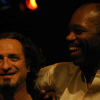
Sangoma Everett
drumsWhen he plays with Deschanel Gordon's band, it's in a harder, more modern style. The added density in the playing of Gordon and drummer
Will Cleasby
drumsHitchcock grew up in Hammersmith, West London, and began learning the saxophone at the age of 10. At high school he was tutored on alto by a teacher called Katie Brown, who got him playing

Charlie Parker
saxophone, alto1920 - 1955
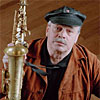
Phil Woods
saxophone, alto1931 - 2015

Cannonball Adderley
saxophone1928 - 1975
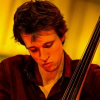
Misha Mullov-Abbado
bass, acoustic
Tom Green
tromboneNow 31, he recently got married, an event that usually makes demands on the pocket-book. So how does he make a living from jazz—a profession famed for its endless opportunities to lose money rather than make it? "My approach has been to say yes to as much as possible—wait for the diary to be full, and then be selective. So I'll still do the odd function, but I'll do it for much more money than I used to. And I'll be a little more selective about which creative projects to do, and I guess in terms of my own thing, I've had generous support from The Arts Council and Help Musicians [formerly the Musicians' Benevolent Fund] in the past. I try to plough money from album sales into the recording of the next album, and reach a point where I'm self-sustaining. And then I'm making money from gigs and the teaching I do."
And there is plenty of work coming up: in November 2022 he released a joint transatlantic project with UK guitarist

Ant Law
guitar, electricb.1983

Eric Harland
drumsb.1976

Joel Ross
vibraphone
Shai Maestro
pianob.1987

Linda May Han Oh
bass, acousticb.1984

Jeff Ballard
drumsb.1963

Kendrick Scott
drumsb.1980
Then there's the Dream Band project (Fresh Sound, 2021). He's anxious to scotch the idea of a single "dream band," in the sense of the best possible band he could play with: there is an infinite number of possible dream bands. But as a graduate of the elite Royal Academy, he's acutely conscious that there's a danger of being pigeonholed, so he's worked hard to engage with musicians right across the diverse London jazz scene. Having spent three days in the studio with a different band each day —"with my favorite musicians who I could get my hands on, plus a couple of guests recorded remotely"—he then recreated the idea in a live context, three different bands on three nights in front of a live audience.
"The most meaningful experiences that I have playing music are: the connections with the people, first and foremost, then the music, then the audience." The people included several who had never played together before. Hitchcock reveled in the resulting chemistry. "It gives you a stimulus to write, because if you can imagine someone's particular voice on a particular tune—
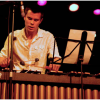
Lewis Wright
vibraphone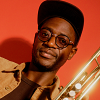
Mark Kavuma
trumpetTags
Profile
Alex Hitchcock
Peter Jones
Jasper H?iby
Herbie Hancock
Resolution 88
Deschanel Gordon
Kirk Lightsey
Myele Manzanza
Matt Ridley
kamasi washington
Sangoma Everett
Will Cleasby
Charlie Parker,
Phil Woods
Cannonball Adderley
Misha Mullov-Abbado
Tom Green
Ant Law
Eric Harland
Joel Ross
Shai Maestro
Linda Oh
Jeff Ballard
Kendrick Scott
Lewis Wright
Mark Kavuma
Comments
PREVIOUS / NEXT
Alex Hitchcock Concerts
Oct
2
Thu

Alex Hitchcock
Ronnie Scott'sLondon, UK
Support All About Jazz
 All About Jazz has been a pillar of jazz since 1995, championing it as an art form and, more importantly, supporting the musicians who make it. Our enduring commitment has made "AAJ" one of the most culturally important websites of its kind, read by hundreds of thousands of fans, musicians and industry figures every month.
All About Jazz has been a pillar of jazz since 1995, championing it as an art form and, more importantly, supporting the musicians who make it. Our enduring commitment has made "AAJ" one of the most culturally important websites of its kind, read by hundreds of thousands of fans, musicians and industry figures every month.







 Buy Now
Buy Now



